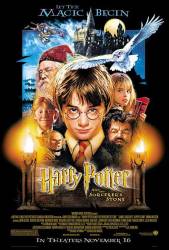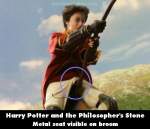Question: This question pertains to all of the Harry Potter movies: What's to keep even one rogue wizard (from the academies) from taking over the world, ruining economies, or blackmailing individual countries? (Voldemort and his allies seem to concentrate on attacking Potter and Hogwarts, not the world, and anyway, the Ministry doesn't seem to stop him.)
Answer: One rogue wizard would be incapable of such a feat. For one thing, most wizards had little interest in, or understanding of, how the Muggle world worked - including technology, financial systems, military functions, infrastructure, and so on. Destroying the Muggle world would only result in the wizarding world collapsing, so there would be no benefit whatsoever. Even other dark wizards would think this was insane and would likely prevent one crazed wizard from attempting it. Gellert Grindelwald wanted to enslave Muggles in the mid-20th century but was defeated.
Question: If Voldemort is attached to Quirrell in this movie, then he heard Snape arguing with Quirrell and threatening him. Wouldn't he then become aware that Snape is actually loyal to Dumbledore? And wouldn't he be angry that Snape tried to protect Harry during the Quidditch game?
Answer: Voldemort believes that Snape is playing a role, not that he is actually loyal to Dumbledore.
Answer: Voldemort wasn't sure he could trust Snape yet, so he didn't reveal himself. Snape saw only Quirrell trying to steal it, so he did everything to stop him.
Question: Two questions. First, why is Hagrid sent to tell Harry about the wizarding world and escort him to Diagon Alley? Being a half-giant, he would attract attention from a lot of Muggles. Second, have no Muggles noticed that several children arrive at King's Cross Station with owls every year? The owls would be seen before the wizarding families approach Platform 9 3/4.
Answer: I would guess Dumbledore sent Hagrid to fetch Harry solely because he knew the half-giant would frighten the Dursleys, who wanted to stop Harry from going to Hogwarts. Hagrid was also on a mission to fetch the Philosopher's Stone from Gringott's Bank at the same time. Magic was apparently used to mask the comings and goings of wizards whenever they were out and about in the Muggle world. Sometimes people noticed odd things happening, but then tended to shrug it off.
Question: What I don't understand is: Dumbledore has the brilliant idea of using the Mirror of Erised to hide the stone in. Yet the mirror is in some room in the castle, where Harry eventually finds it, and not inside the guarded area, where the stone is hidden, until very much later into the movie. Why is that? Even if it was there to teach Harry its secret, it would mean the stone was less efficiently guarded. Or did Dumbledure just get the idea of using the mirror later into the movie ?
Answer: Presumably, Dumbledore came up with his idea after catching Harry in front of the mirror, after he explained the mirror's "power" to Harry. It is safe to assume that the stone was stored in some other magical manner that was less secure before Dumbledore decided to use the mirror.
Answer: In the novel, after Dumbledore catches Harry looking into the mirror again, he tells Harry the mirror will be moved after tonight, and I ask you not to look for it. Dumbledore apparently got the idea to use the mirror for added protection.
Question: Did Dumbledore and other Hogwarts staff know that Voldemort would try to return with the help of the Philosopher's Stone this year, so they transferred it from the bank to Hogwarts, and put such a big protection as the three headed dog etc.? Because I think it's a very big coincidence that after all this years that stone has spent in the bank, they decided to put the stone in school, and the very next day someone tried to steal the stone from the bank. It's like they knew that Voldemort would try to use the stone to return. And if they did, why didn't they figure it out and put protection on over the last 10 years, maybe the very next day when Voldemort was defeated by little Harry? It's really like Dumbledore knew that Voldemort will try to use it, and more important, like he knew that he will try to do it NOW, not in last decade when he was "half alive."
Chosen answer: Dumbledore did probably have an idea that Voldemort might be looking for the stone, but he knew he would never be able to find it as he wanted to use it (Dumbledore's own spell upon it). But the stone gave Dumbledore an opportunity to lure Voldemort to him. So, in order to lure Voldemort out Dumbledore hid it at Hogwarts, closer to him, telling the staff what was going on. Of course then Quirrell knew too and thus Voldemort as well which caused a dangerous situation right the next day, but the general idea was to lure Voldemort out of hiding and into the hands of the Hogwarts teachers. They didn't know yet that Voldemort was already inside Hogwarts as a parasite of Quirrell.
Answer: Dumbledore found out somehow that a servant of Voldemort was going to try to steal the stone. While the bank was a safe place to store something, Dumbledore felt having the stone at Hogwarts with the added protection of the teachers was safer and would be harder for any Death Eater to get inside the castle and past the protection. He had no intention of luring Voldemort anywhere. Hogwarts was safer than the bank and the timing of Hagrid going was easier.
Answer: Mostly right except Dumbledore was not trying to lure Voldemort out. Gringotts was a safe place to keep something, but Hogwarts was safer. Dumbledore would have felt better that the stone was safe in Hogwarts.







Answer: The ministry wasn't seeming to stop him because they couldn't. He was extremely powerful, with a lot of followers, and was able to use magic to hide his crimes. He wanted a pure-blood world, which was strange because he was half-blood (he mostly just hated "mudbloods," though). His ancestry to Salazar Slytherin was one of his main goals to purify the Wizarding race. It is very possible that, after controlling the wizards and getting rid of dangers for him, he would have moved on to control the Muggle world and kill whoever stood in his way.